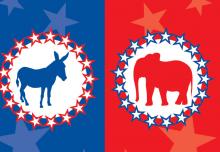political language

What if I told you that the political discourse in America has proven for decades what PSY’s ‘Gangnam Style’ phenomenon has proven recently? What do I mean? It is simply this: people can indeed get tirelessly excited about something that sounds good without understanding its contents.
Like every election year, 2012 seems to have its own particular set of buzzwords and slogans. From “the forgotten 47 percent” to “you did build that,” those on the left and the right are each trying to infuse the political discourse with their own partisan lingo. But it’s time somebody put a stop to the hype and asks the sensible question: “What is the real meaning behind all of this?”
Truth is, both political parties have been directing their resources to highlight their differences more than anything else. They are platforms defined by contrast, not by real facts. This should lead us to raise the question that is usually unasked (and therefore unanswered) amid the consistent heat of the American political climate: “If the government is designed ultimately for the good of the people, is the political discourse today reflective of that goal?”
To this question, the German philosopher Friedrich Nietzsche answers, “No.”